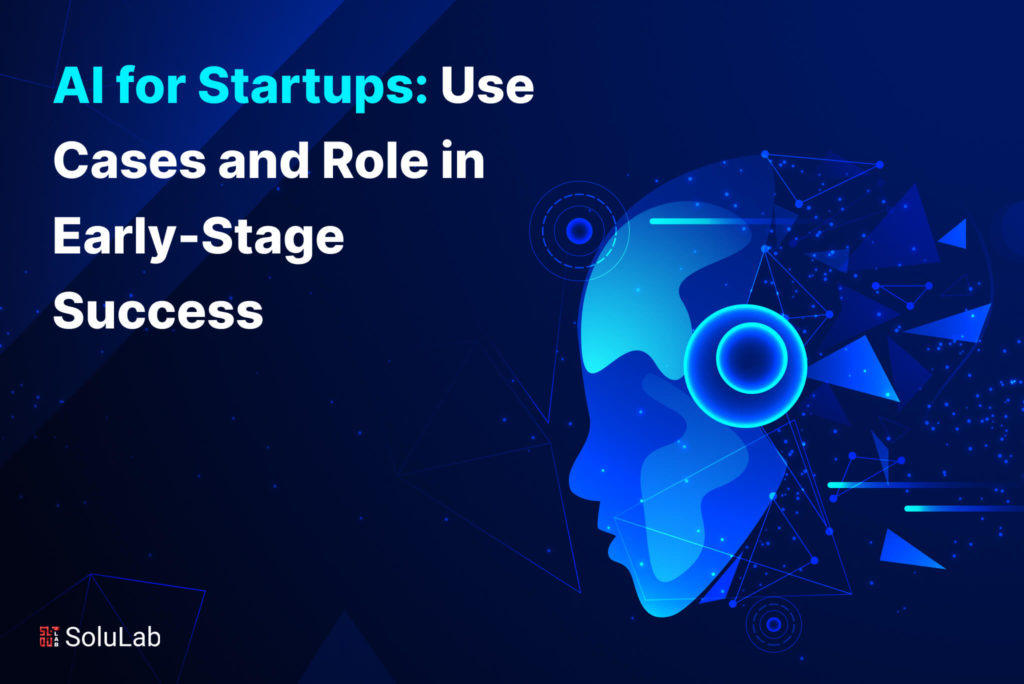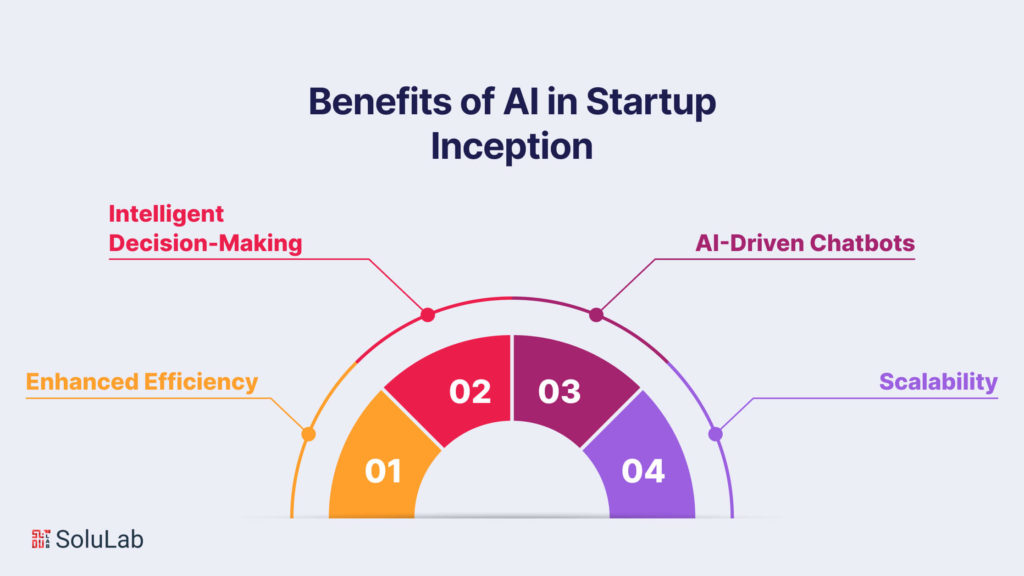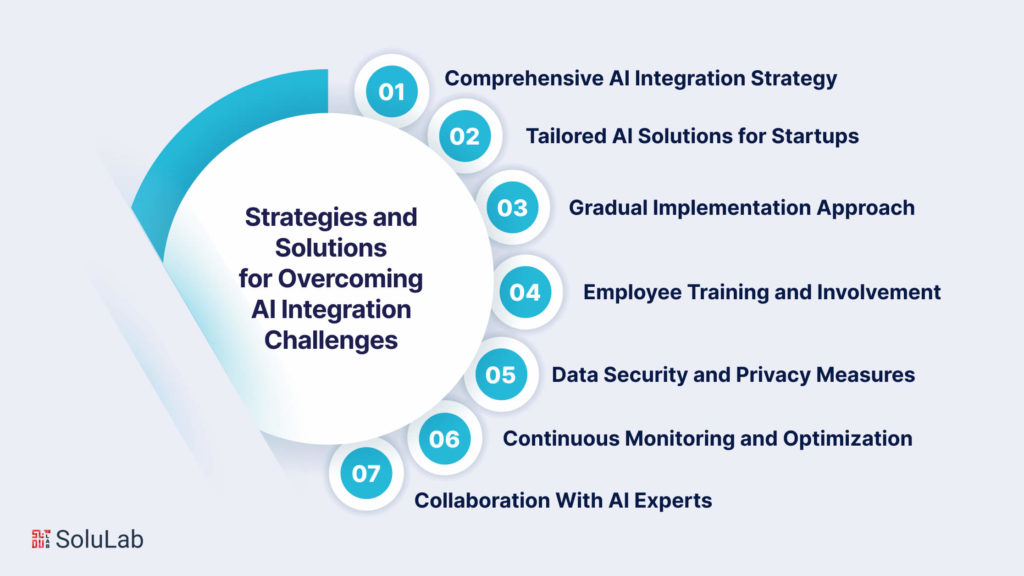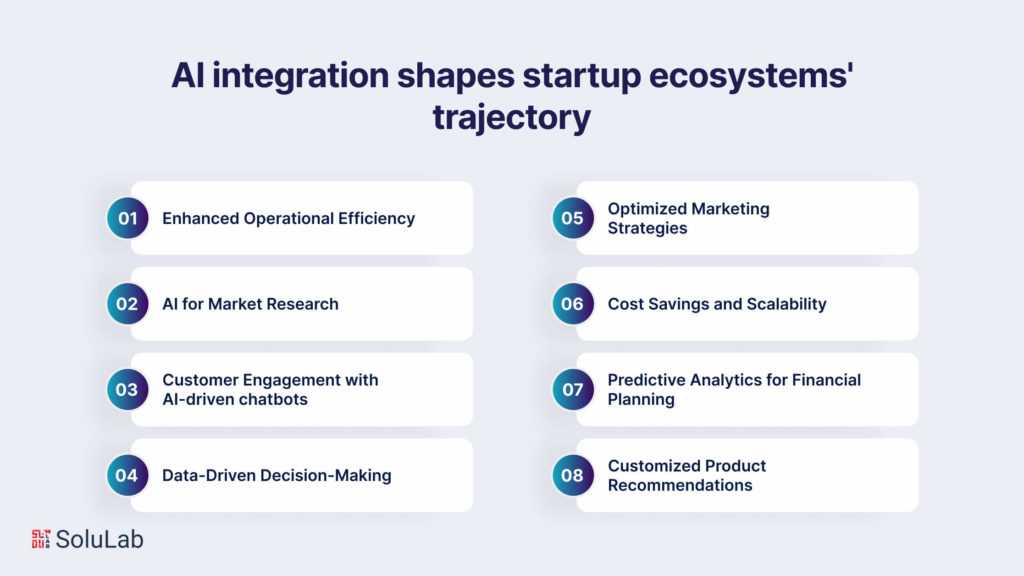
In the dynamic landscape of startups, Artificial Intelligence (AI) has emerged as a transformative force, reshaping the way businesses operate and innovate. AI, in its essence, refers to the simulation of human intelligence in machines, allowing them to learn, reason, and make decisions. In the startup ecosystem, the integration of AI has become synonymous with progress and efficiency.
AI for startups encompasses a broad spectrum of technologies and applications designed to augment human capabilities and streamline processes. It involves the development of algorithms that enable machines to analyze data, recognize patterns, and adapt to changing circumstances. From machine learning to natural language processing, AI empowers startups to automate tasks, gain insights, and make data-driven decisions.
For early-stage startups, the adoption of AI is not merely a technological choice but a strategic imperative. The competitive edge that AI provides can be a game-changer, allowing startups to navigate the complexities of the market with agility. By leveraging AI-driven solutions, startups can optimize operations, enhance product offerings, and gain a deeper understanding of customer needs, thereby fostering growth and sustainability.
What is AI’s Fundamental Role in Startups?
In the dynamic landscape of modern entrepreneurship, the integration of Artificial Intelligence (AI) has emerged as a pivotal factor in shaping the success trajectory of startups. From the inception stage, AI offers multifaceted advantages that redefine traditional business operations, providing a competitive edge and fostering innovation.
Benefits of AI in Startup Inception

-
Enhanced Efficiency
AI-powered tools streamline various processes, automating repetitive tasks and allowing startups to allocate resources more efficiently. This not only reduces operational costs but also enables teams to focus on strategic, high-value tasks.
-
Intelligent Decision-Making
Leveraging AI for market research equips startups with data-driven insights, enabling informed decision-making. Analyzing vast datasets, AI identifies market trends, consumer preferences, and competitor strategies, empowering startups to make strategic moves.
-
AI-Driven Chatbots
Integration of AI-driven chatbots transforms customer interactions. These virtual assistants offer real-time support, handle queries, and personalize user experiences. This not only enhances customer satisfaction but also frees up human resources for more complex tasks.
-
Scalability
Startups often face challenges related to scalability. AI provides scalable solutions that can adapt to growing demands seamlessly. This scalability is particularly crucial for startups experiencing rapid expansion.
How Can Startups Harness the Power of AI for Growth and Innovation?
-
Customer Service Enhancement
Startups are increasingly relying on AI-driven chatbots to revolutionize customer service. These virtual assistants provide real-time responses, enhancing engagement and satisfaction. Additionally, personalization through AI-powered recommendations ensures a tailored customer experience, boosting retention rates.
-
Operational Efficiency
AI contributes significantly to operational efficiency by automating routine tasks and minimizing errors. Startups benefit from streamlined operations, allowing teams to focus on strategic initiatives. AI algorithms further optimize workflows, identifying bottlenecks and inefficiencies for improved productivity.
-
Product Development and Innovation
AI plays a pivotal role in product development and innovation for startups. Leveraging AI in product development and for market research provides valuable insights into consumer preferences and market trends. Additionally, AI-powered tools enable predictive analysis and trend forecasting, guiding startups in designing products that align with market demands.
-
Marketing and Sales
In the realm of marketing and sales, AI is a game-changer for startups. AI-driven targeted marketing strategies leverage consumer data for precise campaigns, enhancing marketing ROI and customer engagement. Sales forecasting and lead generation benefit from AI’s analytical capabilities, empowering startups to identify opportunities and challenges in the market.
Incorporating AI into startup operations is not just a trend but a strategic necessity. From enhancing customer interactions to optimizing workflows and driving innovation, startups that integrate AI into their business model position themselves for sustained growth and success in today’s digital landscape.
How Has the Integration of AI Empowered Early-Stage Success for Startups?
In the dynamic landscape of modern business, the strategic implementation of artificial intelligence (AI) has emerged as a game-changer for startups, propelling them toward unprecedented success. This article explores the impact of AI on early-stage ventures, shedding light on case studies that vividly illustrate how startups have harnessed the power of AI to achieve remarkable growth and scalability.
-
AI for Startups: Catalyst for Growth
Startups are increasingly recognizing AI as an indispensable tool for gaining a competitive edge. The ability of AI to analyze vast datasets, identify patterns, and generate valuable insights has revolutionized decision-making processes. One standout case is that of a tech startup leveraging AI for market research, enabling it to decipher market trends, consumer preferences, and competitor strategies with unparalleled precision.
-
AI-Driven Chatbots: Transforming Customer Interaction
The integration of AI-driven chatbots has become a pivotal strategy for startups aiming to enhance customer engagement. These intelligent chatbots, armed with natural language processing capabilities, not only provide instant responses but also gather valuable customer data. A case study in point involves an e-commerce startup utilizing AI-powered chatbots to provide personalized product recommendations, resulting in a significant boost in sales and customer satisfaction.
-
Scalability Unleashed: AI Tools for Startups
AI tools have proven to be instrumental in enhancing the scalability of startups. Automation of routine tasks, predictive analytics, and process optimization are among the myriad ways AI facilitates operational efficiency. An innovative startup, specializing in logistics, implemented AI integration to optimize route planning, reduce delivery times, and lower operational costs, leading to rapid scalability and market expansion.
-
Unlocking Insights: AI Use Cases in Startups
The transformative potential of AI extends beyond operational efficiency to profound insights generation. Startups engaged in diverse sectors, from healthcare to finance, are leveraging AI for data analysis, uncovering trends, and making data-driven decisions. This article delves into a case study of a healthcare startup that harnessed AI to analyze patient data, leading to groundbreaking discoveries and personalized treatment approaches
How Can Startups Navigate the Complexities of AI Integration to Overcome Challenges?
In the rapidly evolving landscape of technology, startups are increasingly turning to Artificial Intelligence (AI) as a transformative force to gain a competitive edge. While the benefits of AI for startups are undeniable, the journey of integrating AI into business processes is often riddled with complexities. Navigating these challenges strategically is crucial for startups to harness the full potential of AI and unlock new opportunities.
-
Understanding the Landscape: AI for Startups
AI for startups is not a one-size-fits-all solution. Startups must first identify and understand their unique needs and objectives before diving into AI integration. Conducting a thorough assessment of existing processes and pinpointing areas where AI can add value is the initial step. This approach ensures a tailored and efficient integration process.
-
AI Use Cases in Startups: Tailoring Solutions to Needs
Startups must explore diverse AI use cases to find the applications most relevant to their industry and goals. Whether it’s streamlining operations, enhancing customer experiences, or optimizing decision-making, identifying the right AI use cases is pivotal. Startups can leverage AI for market research, gaining valuable insights to inform business strategies and stay ahead in dynamic markets.
Related: Use Cases Of AI Agents
-
The Rise of AI-Driven Chatbots: Personalized Customer Interactions
AI-driven chatbots stand out as a powerful tool for startups looking to enhance customer engagement. These intelligent chatbots not only provide instant responses but also learn from interactions, improving their effectiveness over time. Integrating AI-driven chatbots into customer support and communication channels can significantly boost efficiency and customer satisfaction.
-
Overcoming Integration Challenges: A Strategic Approach
AI integration in business is often met with challenges such as data compatibility, infrastructure limitations, and workforce adaptation. Startups need to approach integration strategically, addressing these challenges one step at a time. Collaborating with AI experts, investing in employee training, and gradually implementing AI tools can facilitate a smoother integration process.
Strategies and Solutions for Overcoming AI Integration Challenges

In the dynamic realm of business, startups are increasingly turning to Artificial Intelligence (AI) to gain a competitive edge. However, integrating AI into existing business frameworks poses a unique set of challenges. From the inception of AI for startups to leveraging AI tools for market research, businesses must adopt strategic approaches to overcome integration hurdles.
-
Comprehensive AI Integration Strategy
Developing a comprehensive strategy is fundamental to successful AI integration in startups. Start by conducting a thorough assessment of business processes and identifying areas where AI can enhance efficiency. Prioritize use cases in startups that align with core business objectives, ensuring a focused and impactful implementation.
-
Tailored AI Solutions for Startups
Off-the-shelf AI solutions might not always align with the specific needs of startups. Customized solutions tailored to the unique requirements of the business can ensure seamless integration. This approach maximizes the benefits of AI integration in business by addressing specific pain points and streamlining operations.
-
Gradual Implementation Approach
Avoiding a rushed integration is crucial, especially for startups with limited resources. Adopt a phased implementation approach, starting with AI-driven chatbots for customer support or basic AI use cases in startups. Gradually scaling up allows for better adaptation, minimizes disruptions, and helps in identifying and resolving integration issues promptly.
-
Employee Training and Involvement
AI integration in startups necessitates a cultural shift within the organization. Provide adequate training to employees to ensure they are well-versed in working alongside AI tools for startups. Encourage a collaborative environment where employees actively participate in the integration process, fostering a smoother transition.
-
Data Security and Privacy Measures
As AI relies heavily on data, ensuring robust security and privacy measures is paramount. Establish protocols for data collection, storage, and usage, adhering to compliance standards. This is particularly crucial for AI integration in business, where customer trust and data integrity play pivotal roles.
-
Continuous Monitoring and Optimization
Post-integration, continuous monitoring is essential for identifying potential issues and optimizing AI algorithms. Regularly evaluate the performance of AI-driven chatbots and other integrated solutions. This iterative process ensures that the AI remains aligned with evolving business needs and market dynamics.
-
Collaboration With AI Experts
For startups venturing into AI for market research or other complex applications, collaborating with AI experts can be invaluable. Seek partnerships with professionals who specialize in AI integration, leveraging their expertise to navigate challenges effectively.
How Can Startups Strategically Implement AI Tools to Drive Innovation and Growth?
In the ever-evolving landscape of business, startups are increasingly turning to Artificial Intelligence (AI) as a strategic ally to gain a competitive edge. This article provides an insightful overview of accessible AI tools for startups, emphasizing cost-effective solutions tailored for early-stage companies.
-
AI for Startups: A Game-Changer in Business Strategy
Startups are harnessing the power of AI to revolutionize various aspects of their operations. From streamlining processes to gaining valuable insights, AI is proving to be a versatile tool for enhancing efficiency. One of the prominent AI use cases in startups is its integration into business strategies, transforming how companies operate and engage with their customers.
-
AI-Driven Chatbots: Enhancing Customer Interaction
The integration of AI-driven chatbots has become a cornerstone for startups looking to enhance their customer interaction. These intelligent bots not only provide instant responses to queries but also learn from interactions, improving their performance over time. This cost-effective solution allows startups to provide round-the-clock support and personalized experiences without the need for an extensive human workforce.
-
AI Integration in Business: Maximizing Efficiency
AI integration in business extends beyond customer service. Startups are increasingly adopting AI tools to automate routine tasks, analyze large datasets, and derive actionable insights. This integration enhances decision-making processes, enabling startups to make informed choices based on real-time data. From inventory management to predictive analytics, AI is a transformative force in optimizing business operations.
-
Cost-Effective AI Solutions for Early-Stage Companies
Recognizing the budget constraints of early-stage companies, several AI tools cater specifically to startups. These tools offer a range of functionalities, from basic automation to advanced analytics, at affordable prices. Startups can leverage these cost-effective solutions to kickstart their AI journey without compromising on quality or functionality.
-
AI for Market Research: Unveiling Insights for Growth
Market research is a critical component for startups aiming to understand their target audience and industry dynamics. AI tools for startups in market research provide advanced analytics, sentiment analysis, and predictive modeling. These tools not only save time but also unveil valuable insights that can drive informed decision-making and fuel growth strategies.
-
The Future of AI in Startups
As technology continues to advance, the future of AI in startups will only become more significant. The key lies in strategic integration, choosing the right AI tools, and staying abreast of the latest developments in the field. From enhancing customer experiences with AI-driven chatbots to optimizing business processes through intelligent automation, startups can leverage these resources to pave the way for success in today’s competitive business landscape.
How is the Integration of Artificial Intelligence (AI) Influencing the Trajectory of Startup Ecosystems?

In a rapidly evolving technological landscape, the integration of artificial intelligence (AI) is poised to reshape the future of startups, offering innovative solutions and unlocking unprecedented opportunities. Here’s a closer look at the profound impact of AI on startups, highlighting key use cases and benefits:
-
Enhanced Operational Efficiency
Implementation of AI-driven tools and algorithms streamlines various operational processes, reducing manual workload and optimizing resource allocation.
AI integration in business operations automates repetitive tasks, allowing startups to focus on core competencies and strategic initiatives.
-
AI for Market Research
Startups can leverage AI algorithms to gather and analyze vast amounts of market data swiftly and accurately.
AI-driven market research tools provide valuable insights into consumer behavior, preferences, and market trends, enabling startups to make informed decisions and refine their strategies.
-
Customer Engagement with AI-driven chatbots
AI-powered chatbots revolutionize customer interactions, providing personalized and immediate responses.
Startups employing AI-driven chatbots enhance customer satisfaction, improve engagement, and gain a competitive edge in the market.
-
Data-Driven Decision-Making
AI tools for startups enable data analysis on a large scale, facilitating data-driven decision-making processes.
Startups can harness the power of AI to extract meaningful patterns from data, identify trends, and make informed business decisions that drive growth.
-
Optimized Marketing Strategies
AI facilitates targeted marketing campaigns by analyzing customer preferences and behaviors.
Startups can deploy AI algorithms to create personalized marketing strategies, ensuring more effective customer outreach and improved conversion rates.
-
Cost Savings and Scalability
AI integration in startups leads to cost savings through automation, reducing the need for extensive human intervention.
Scalability becomes more achievable as AI systems can adapt and handle increased workloads without a proportional increase in operating costs.
-
Predictive Analytics for Financial Planning
AI-driven predictive analytics assist startups in forecasting financial trends and identifying potential risks.
By integrating AI into financial planning, startups can develop more robust strategies and navigate uncertainties with greater confidence.
-
Customized Product Recommendations
AI algorithms analyze customer preferences and purchase history to provide personalized product recommendations.
Startups can enhance user experience and drive sales by offering tailored suggestions through their AI-driven recommendation systems.
Conclusion
In conclusion, the pivotal role of AI for startups cannot be overstated, particularly when examining its diverse use cases and its impact on early-stage success. SoluLab, as a forward-thinking entity, recognizes the transformative potential of AI and has strategically positioned itself to harness its power for the benefit of startups.
The integration of AI in business processes, exemplified by SoluLab’s commitment, underscores its dedication to innovation and efficiency. AI-driven chatbots, a standout use case, play a central role in enhancing customer engagement, streamlining communication, and ultimately contributing to a positive customer experience. This not only establishes a competitive edge for startups but also fosters brand loyalty.
Furthermore, the application of AI in market research stands out as a game-changer. SoluLab’s as an AI development company emphasis on leveraging AI tools for startups facilitates data-driven decision-making, enabling entrepreneurs to glean valuable insights into market trends, consumer behavior, and competitive landscapes. This, in turn, empowers startups to make informed strategic choices and adapt swiftly to dynamic market conditions.
FAQs
1. What is the significance of AI for startups in today’s business landscape?
AI for startups plays a pivotal role in enhancing operational efficiency, automating processes, and gaining a competitive edge. Its ability to analyze vast datasets and provide actionable insights can significantly contribute to early-stage success.
2. How can startups leverage AI use cases to streamline their operations?
Startups can employ AI use cases in various domains, such as customer service, marketing, and product development. AI-driven chatbots, for instance, offer real-time customer support, reducing response times and improving user experience.
3. What are the key AI use cases in startups for market research?
AI empowers startups in market research by automating data analysis, predicting market trends, and extracting valuable insights. This not only saves time but also enables startups to make data-driven decisions that are crucial for their growth.
4. How can AI integration in business impact the scalability of startups?
Integrating AI in business processes can enhance scalability by automating repetitive tasks, allowing startups to focus on strategic initiatives. This integration optimizes resource allocation, fostering growth and adaptability in the dynamic startup environment.
5. Can you provide examples of AI tools tailored for startups?
Several AI tools cater specifically to startups, aiding in tasks like data analytics, customer relationship management, and workflow automation. These tools empower startups to harness the full potential of AI without overwhelming complexity.
6. How does AI for startups contribute to early-stage success in customer engagement?
AI-driven chatbots and virtual assistants are instrumental in customer engagement, offering personalized interactions and quick problem resolution. This not only improves customer satisfaction but also frees up resources for startups to invest in core business activities.






